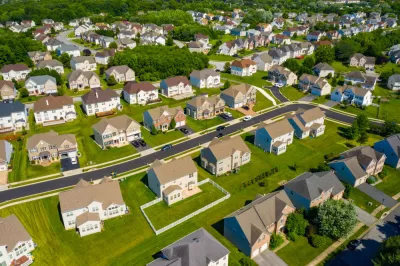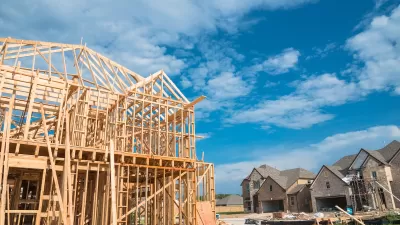A counterintuitive argument contends that from a housing justice perspective, the Biden administration's attack on exclusionary zoning is imprudent.

Joe Biden is now the 46th president of the United States. I join many, likely most, of those in the community of scholars and reflective practitioners concerned with the sorry state of American housing policy in saying “good riddance” to our former president. And breathing an enormous sigh of relief.
YIMBYs, as well as many advocates for housing justice, have cheered a key provision in Biden’s housing plan that targets “exclusionary zoning” (EZ) for elimination. EZ, according to his plan, must go because it “perpetuate[s] discrimination” that “for decades [was used] strategically … to keep people of color and low-income families out of certain communities.”
In a recent article in Urban Affairs Review (UAR)—under the Strangelovian title “Rethinking Exclusionary Zoning or: How I Stopped Worrying and Learned to Love It”—I counterintuitively contended that, from a housing justice perspective, the attack on EZ is imprudent. In my choice of title I was, as I said at the outset of the article, of course being “deliberately provocative and more than a bit facetious.” Overly restrictive zoning can certainly be a source of harms. Rather than “love” EZ, my central claim was that we should simply come to accept it—and thus stop worrying about it so much compared to other much more virulent and insidious forces that militate against housing justice in drastically more significant ways.
UAR editor Jered Carr solicited responses from three smart housing experts with contrasting viewpoints—Katherine Levine Einstein, Edward Goetz, and Rolf Pendall. These, along with a reply from me, will appear in print just as the new Biden administration, with its plan to eliminate EZ in hand, assumes office. To mark the occasion, Shelterforce invited me to revisit my argument here.
I contend that the effort to eliminate EZ—what I dub the Anti-EZ Project—embraces a worldview whose actualization would be far more detrimental to the cause of housing justice (and social justice more broadly) than the actual impacts of EZ. While it is clear that EZ measures often (though not always) both reflect and perpetuate the ubiquitous racism and white supremacy that profoundly corrupt the promise of America, the project to eliminate them inflicts a greater degree of racialized suffering upon those disadvantaged by both class standing and skin color. In short, the Anti-EZ cure is worse—much worse, in fact—than the EZ disease.
Why? My argument boils down to this:
....
FULL STORY: Say It Ain’t So, Joe: Biden’s Ill-Advised Plan to Eliminate Exclusionary Zoning

Alabama: Trump Terminates Settlements for Black Communities Harmed By Raw Sewage
Trump deemed the landmark civil rights agreement “illegal DEI and environmental justice policy.”

Study: Maui’s Plan to Convert Vacation Rentals to Long-Term Housing Could Cause Nearly $1 Billion Economic Loss
The plan would reduce visitor accommodation by 25% resulting in 1,900 jobs lost.

Planetizen Federal Action Tracker
A weekly monitor of how Trump’s orders and actions are impacting planners and planning in America.

Wind Energy on the Rise Despite Federal Policy Reversal
The Trump administration is revoking federal support for renewable energy, but demand for new projects continues unabated.

Passengers Flock to Caltrain After Electrification
The new electric trains are running faster and more reliably, leading to strong ridership growth on the Bay Area rail system.

Texas Churches Rally Behind ‘Yes in God’s Back Yard’ Legislation
Religious leaders want the state to reduce zoning regulations to streamline leasing church-owned land to housing developers.
Urban Design for Planners 1: Software Tools
This six-course series explores essential urban design concepts using open source software and equips planners with the tools they need to participate fully in the urban design process.
Planning for Universal Design
Learn the tools for implementing Universal Design in planning regulations.
Caltrans
Smith Gee Studio
Institute for Housing and Urban Development Studies (IHS)
City of Grandview
Harvard GSD Executive Education
Toledo-Lucas County Plan Commissions
Salt Lake City
NYU Wagner Graduate School of Public Service





























